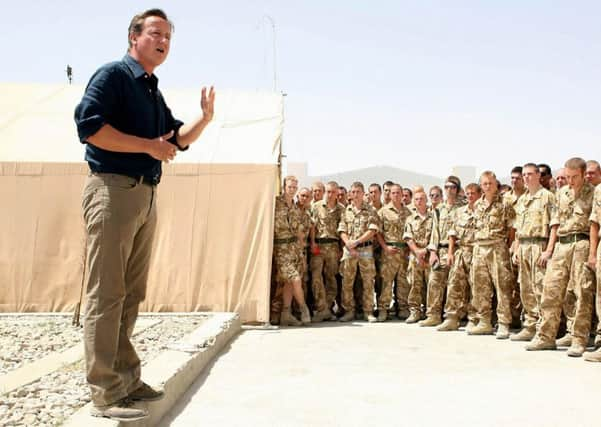YP Comment: Standing up to the Taliban


DID they die in vain? This is the soul-searching question being asked after reports that British troops are being re-deployed in Afghanistan after the Taliban seized control of the strategic town of Sangin where 100 UK service personnel, including many soldiers in Yorkshire, perished in the past decade,
Though Lord Dannatt, the former chief of the general staff, offered some reassurance when he said this was a “lower priority” than the current unrest in Syria and Libya, and the threat that these intractable conflicts pose to world peace at present, it is a powerful reminder that this country finds itself embroiled in a largely invisible war which is being fought on many fronts.
Advertisement
Hide AdAdvertisement
Hide AdHowever there were concerns, when Nato forces left the war-torn Helmand province, that the Taliban would attempt to regroup and this now appears to be the case. Yet, while many will be uncomfortable at the expertise of the SAS and others being required in Afghanistan, turning a blind eye to this insurgency is not an option – one reason the resistance offered by these fighters proved so formidable was because Britain and America allowed themselves to become sidetracked by the overthrow of Saddam Hussein and the ensuring war in Iraq.
As the RAF launch airstrikes against targets held by Daesh – the so-called Islamic State – in Syria, it is paramount that the West provides Afghan forces with the expertise they require in order to preserve a hard-won peace. However a failure to intervene will be a betrayal to the memory of those 456 military heroes from the UK who made the ultimate sacrifice when they answered their country’s call so bravely.
A sober warning
IT’s a familiar story – a missed last bus, not having enough money for a taxi, then a potentially fatal decision skewed by drink to chance the drive home. Despite the laws, high-profile campaigns and a huge change in social attitudes, hundreds still die in road accidents in which drink driving played a part. And, of course, for every death is a family destroyed; loved ones consumed by grief and lives changed forever.
The figures do not tell us, also, how many people have been left disabled or disfigured as a result of drinking and driving, perhaps to the extent that lives have been irrevocably damaged or livelihoods lost.
Advertisement
Hide AdAdvertisement
Hide AdDrink driving remains a menace, even though 50 years of campaigning against it have wrought profound changes in perceived acceptable behaviours and brought the numbers whose lives are blighted or destroyed relentlessly downwards. Thirty-six years ago, 1,640 people died in road accidents in which drink was a factor. The twin-track approach of hard-hitting advertising and relentless enforcement by police, has been a major success.
But there is still a hard core of offenders out there, some full of contemptible bravado about how much they can drink without being affected, others cocksure about not getting caught. However successful the anti-drink driving campaign has been, more still needs to be done. The annual blitz focuses minds, but it remains a year-round problem and the continuing relentlessness of policing is part of the answer, of course, This is a battle in which no quarter should be given. For at this time of year, more than any other, lives really are at stake.
Christmas television traditions
christmas TELEVISION today is very different to yesteryear when upwards of 20 million viewers regularly gathered around the small screen to watch Only Fools and Horses or those classic comedies which were the BBC’s hallmark for so long. The plethora of channels, and the choice that this affords viewers, means the most watched programme on Christmas Day is likely to attract half the audience which Del Boy and Rodney commanded.
Yet the level of intrigue ahead of Doctor Who and Downton Abbey suggests there’s still a large market for family entertainment – perhaps the main terrestrial broadcasters can be encouraged to be this creative on a more regular basis in 2016 rather than simply timing the most popular programmes in order to scupper the plans of their commercial rivals.
Advertisement
Hide AdAdvertisement
Hide AdAt least they have not dared to alter the Queen’s Speech – the one moment of the year, at 3pm on Christmas Day, when tradition still dictates that families come together to listen to Her Majesty’s address to the nation and the Commonwealth. Long may this continue, especially when endless commercial pressures are so impinging upon the sanctity of Christmas.